Information on applied exams at hotel sites
Last updated (March, 2024)
BOOKMARK THIS PAGE!
This page is for those candidates who are taking their applied exam at a hotel exam site. Information and FAQs will be updated regularly. We recommend that you bookmark this page, so you can easily return to it for reference.
Step 1: Be prepared for your exam
Step 2: Review the applied exam interface
Step 3: Candidate Information Session
Questions about the 2024 exams
Step 1: Be prepared for your exam
Where do I go?
Your appointment letter will indicate the details of your exam, including the date, time and the city where you are registered to be examined. You can also check our website for dates and locations of 2024 exams.
If there are any changes to locations, candidates and exam stakeholders will be notified by email.
What do I bring?
Please bring the following:
- Government-issued photo ID with a signature. Examples include a passport, driver’s license or provincial health card.
- Any personal protective equipment (PPE) that candidates may wish to wear for the exams. Some PPE equipment (masks) and hand sanitizer will be available to candidates, and
- Snack and drink.
What am I not allowed to bring to my exam?
- Electronic devices are not allowed in your hotel exam room. There will be a designated area to store all your personal belongings. All electronic devices, including cell phones and digital/smartwatches, will be collected at the time of registration and are not permitted in the exam rooms. They will be returned to you at the end of the examination or sequestering period.
- If you wish to wear a watch for your own timekeeping purposes, please wear an analogue watch. There is also a timer on the exam interface and in the bottom corner of the laptop.
What should I do the day before my exam?
- Check the address of your hotel exam site to determine travel time and route to get there.
- Check your email to ensure there are no new notifications about your exam.
What happens on exam day?
- Check your email to ensure there are no new notifications about your exam.
- Register at the hotel exam site with your government-issued photo ID.
- An admission card will be presented to you at the exam site during your registration. A representative of the Royal College will ask you to sign it.
- You will be escorted by an invigilator to your assigned hotel room.
Step 2: Review the applied exam interface
Watch this video demonstrating how to interact with the Practique system for applied exams.
Logging in to your Exam
Approximately 15 minutes before the start of your exam, you will be instructed to log in to the Practique system, which will be open for you on the laptop provided by the Royal College. Enter the ID and Password (provided when you arrive at your regional examination centre on exam day) and click “LOGIN.”
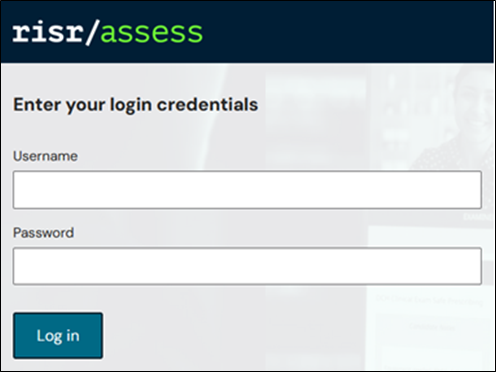 Figure 1: A screenshot of the risr/assess system login screen. The ID and Password fields are highlighted.
Figure 1: A screenshot of the risr/assess system login screen. The ID and Password fields are highlighted.
Once you log in to the exam interface, you will be directed to a holding screen (see image below). Please do not click anything on this page. You do not need to “Choose exam to take…” or enter a PIN. The examination will begin automatically at the scheduled time (10:00 a.m. or 2:00 p.m. Eastern Time).
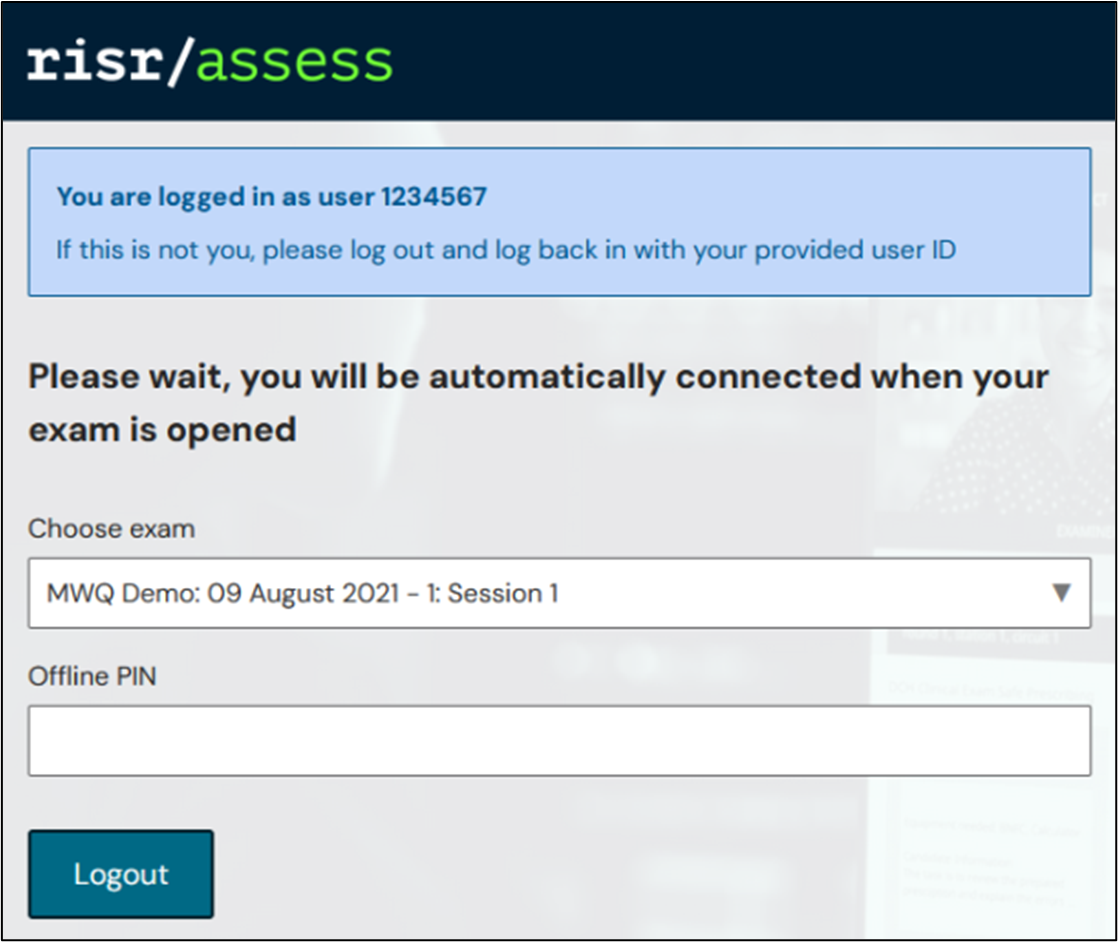 Figure 2: A screenshot of the risr/assess system holding screen.
Figure 2: A screenshot of the risr/assess system holding screen.
![]() Failure to wait, clicking on links or using the keyboard may cause a delay in starting your exam.
Failure to wait, clicking on links or using the keyboard may cause a delay in starting your exam.
Screen Sharing
Note: Screen sharing is only applicable to some exams. If you are prompted to share your screen, you must share your screen throughout the entire exam period. To enable screen sharing, you need to perform the following steps at the beginning of every round:
The pop-up below will appear on your screen. Click “OK.”
 Figure 3: A screenshot of a pop-up indicating that the candidate must share their entire screen with the examiner. The OK button is highlighted.
Figure 3: A screenshot of a pop-up indicating that the candidate must share their entire screen with the examiner. The OK button is highlighted.
You will then be prompted to share your screen. Select the image of the Entire Screen and click “Share.”
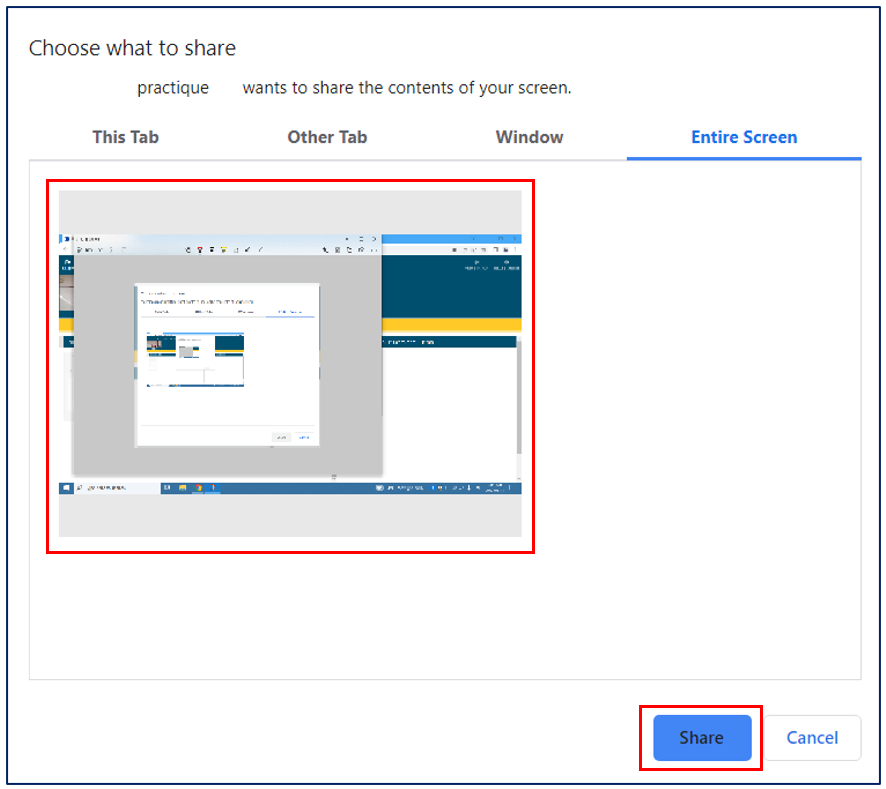 Figure 4: A screenshot of a pop-up prompting the candidate to choose what to share. The image of the Entire Screen is highlighted.
Figure 4: A screenshot of a pop-up prompting the candidate to choose what to share. The image of the Entire Screen is highlighted.
The pop-up below will appear on your screen. You may click “Hide,” but DO NOT click “Stop sharing.”
 Figure 5: A screenshot of a pop-up notifying the candidate that Practique is sharing their screen. The Hide button is highlighted.
Figure 5: A screenshot of a pop-up notifying the candidate that Practique is sharing their screen. The Hide button is highlighted.
Connecting to the Examiner
Once you have enabled screen sharing, you will automatically be connected to the examiner.
Click and hold the left mouse button on the double line below the cameras and drag to adjust camera size.
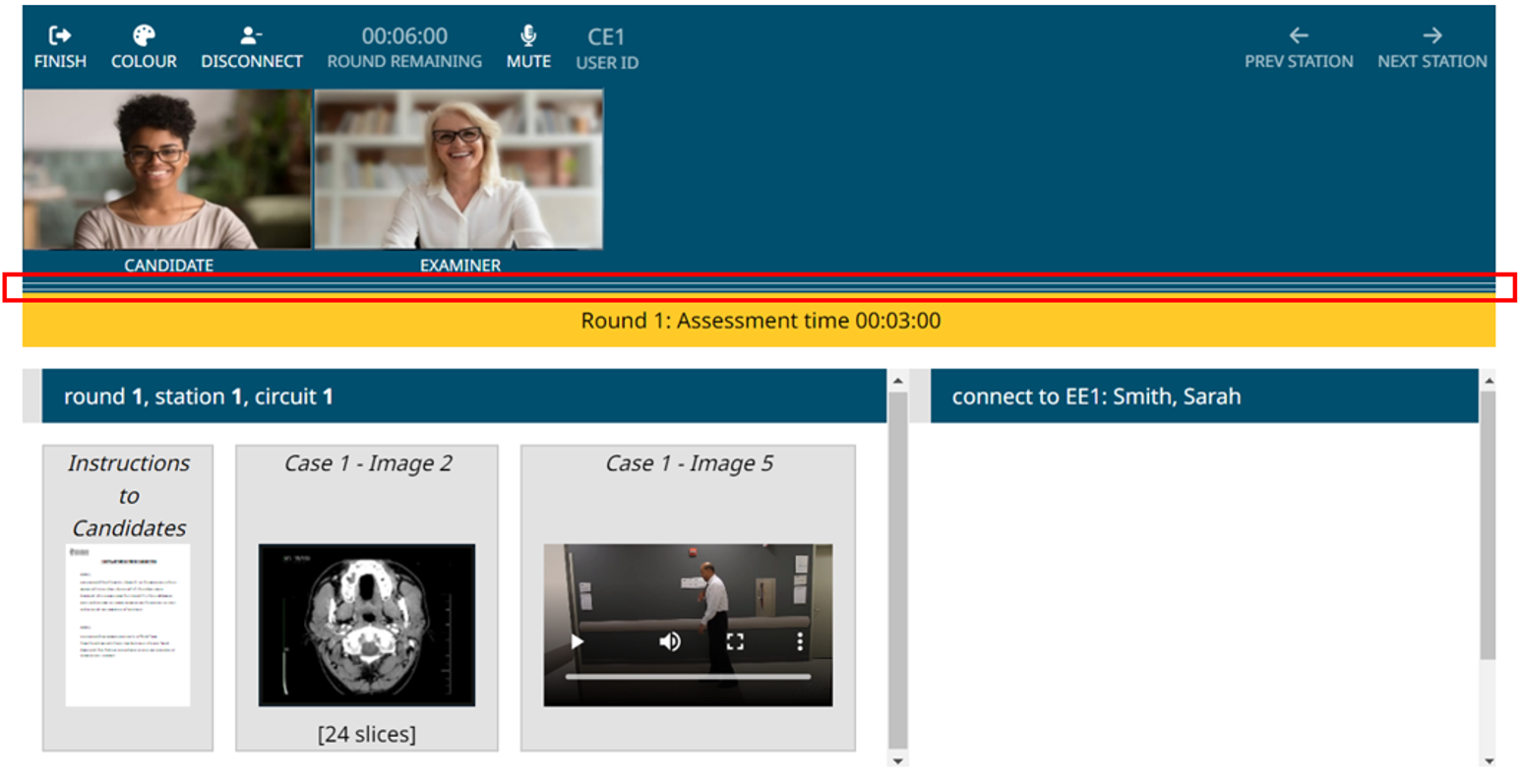 Figure 6: A screenshot of the Practique System interface showing the candidate and examiner cameras with a double line below. The double line is highlighted.
Figure 6: A screenshot of the Practique System interface showing the candidate and examiner cameras with a double line below. The double line is highlighted.
Station Timing
Each station is organized into distinct timing periods:
- Reading Time – Only some exams have dedicated Reading Time. This period is allotted if your station contains notes or instructions for you to read.
- Assessment Time – During this period, you will be answering questions posed by the examiner. You may be given additional resources to review.
- Marking Time – During this period, please sit quietly with your camera and microphone ON and wait for the next station.
There are two areas on the interface that reference time:
- Round Remaining is a countdown of the total time allotted to the station.
- The yellow notification bar displays and counts down the time period you are in.
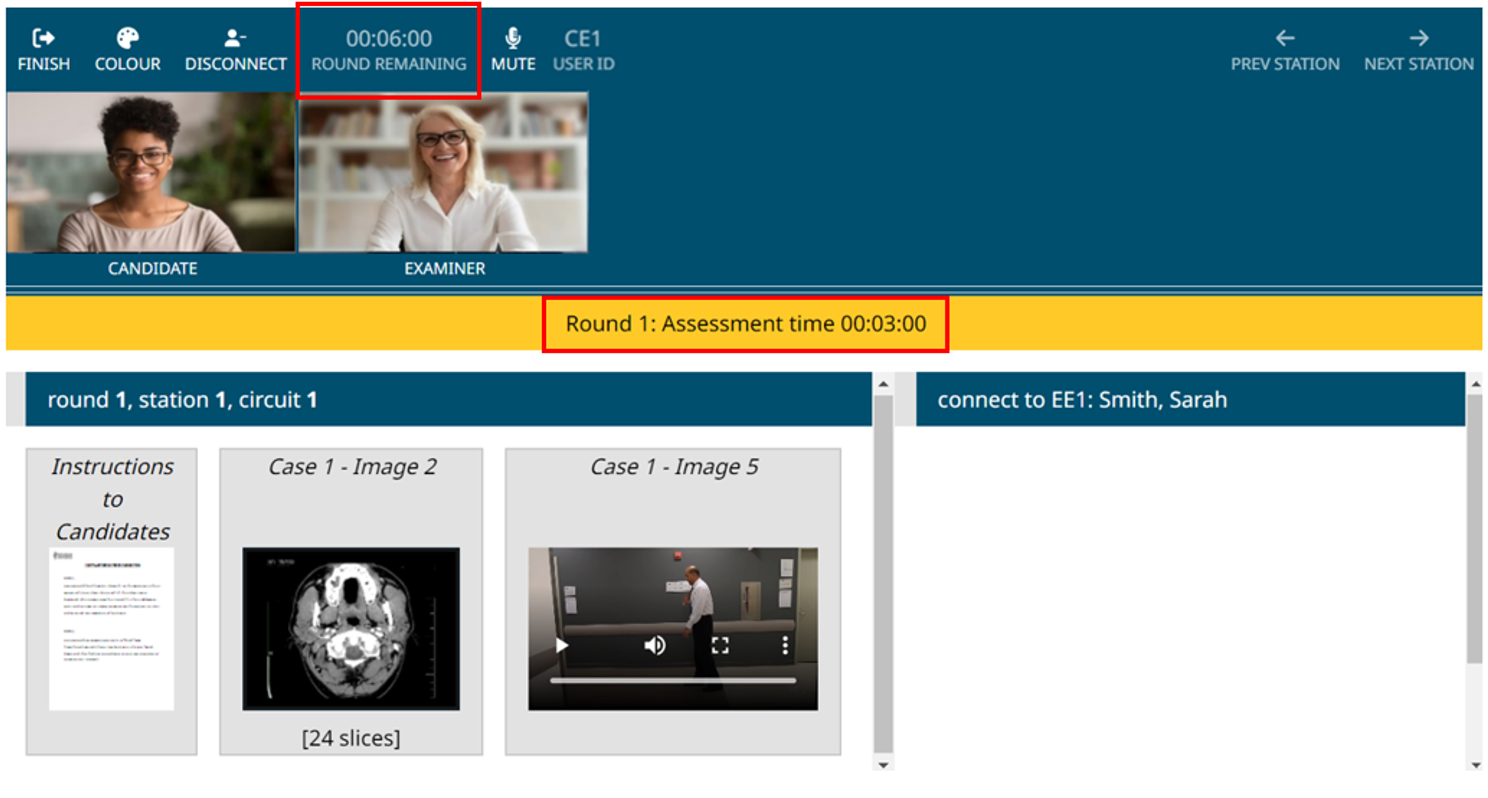 Figure 7: A screenshot of the Practique System interface showing areas that reference time. The Round Remaining and Time Period displays are highlighted.
Figure 7: A screenshot of the Practique System interface showing areas that reference time. The Round Remaining and Time Period displays are highlighted.
Viewing and Manipulating Image Resources
Throughout the station, examiners may release resources for you to review. Resources are composed of images (scans, x-rays, test results, etc.), videos, decks, etc.
- To open an image resource, click once on the thumbnail.
- To open an image resource in fullscreen, click on the expand button
 . Click on it again to exit fullscreen.
. Click on it again to exit fullscreen. To manipulate an image resource, use the control options:
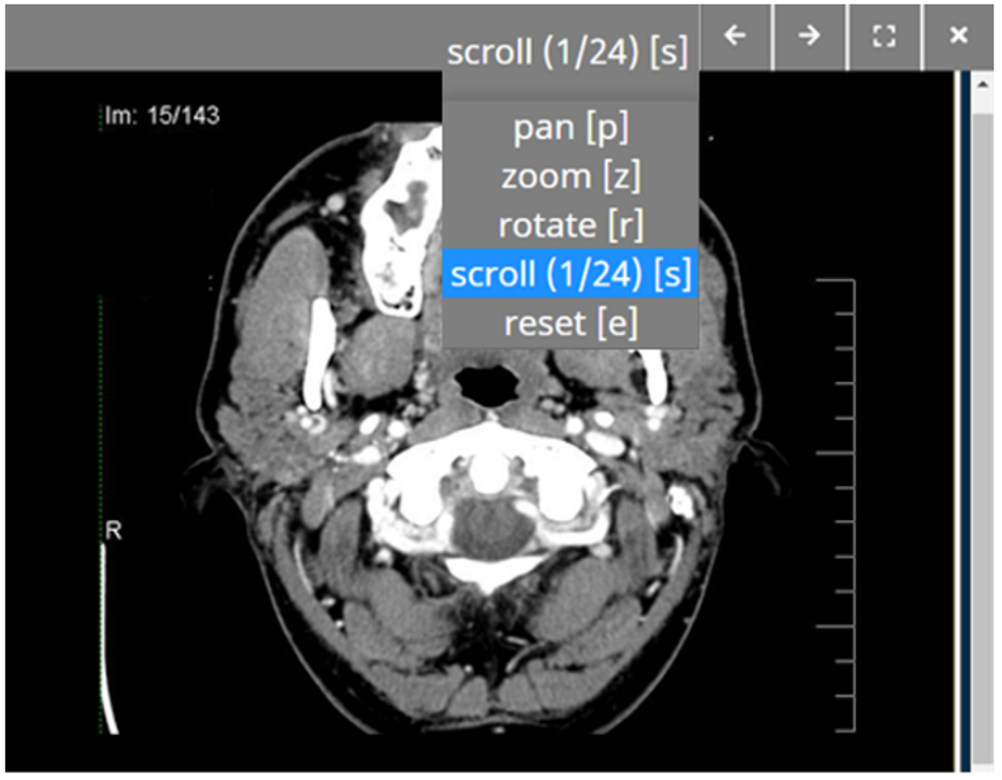 Figure 8: A screenshot of an open image resource showing the control options menu.
Figure 8: A screenshot of an open image resource showing the control options menu.Move the resource:
Select “PAN,” hold the left mouse button down and move mouse.Zoom in/out of the resource:
Select “ZOOM,” hold left mouse button down and move mouse forward or backward.Rotate the resource:
Select “ROTATE,” hold left mouse button down and move mouse forward or backward.Scroll through a multi-page resource:
Select “SCROLL,” hold left mouse button down and move mouse forward or backward. You can also use the arrows.
Reset the resource to its original state:
Select “RESET.”- To close an image resource, click the “X” button.

Viewing and Manipulating Video Resources
To open a video resource in fullscreen:
- Click on the expand button in the bottom right of the thumbnail, OR
Click on the three vertical dots in the bottom right corner of the thumbnail and select “Fullscreen.”
 Figure 9: A screenshot of video resources showing the control options. The expand button and fullscreen buttons are highlighted.
Figure 9: A screenshot of video resources showing the control options. The expand button and fullscreen buttons are highlighted.Once opened, click on the play button on the bottom left to play the video.
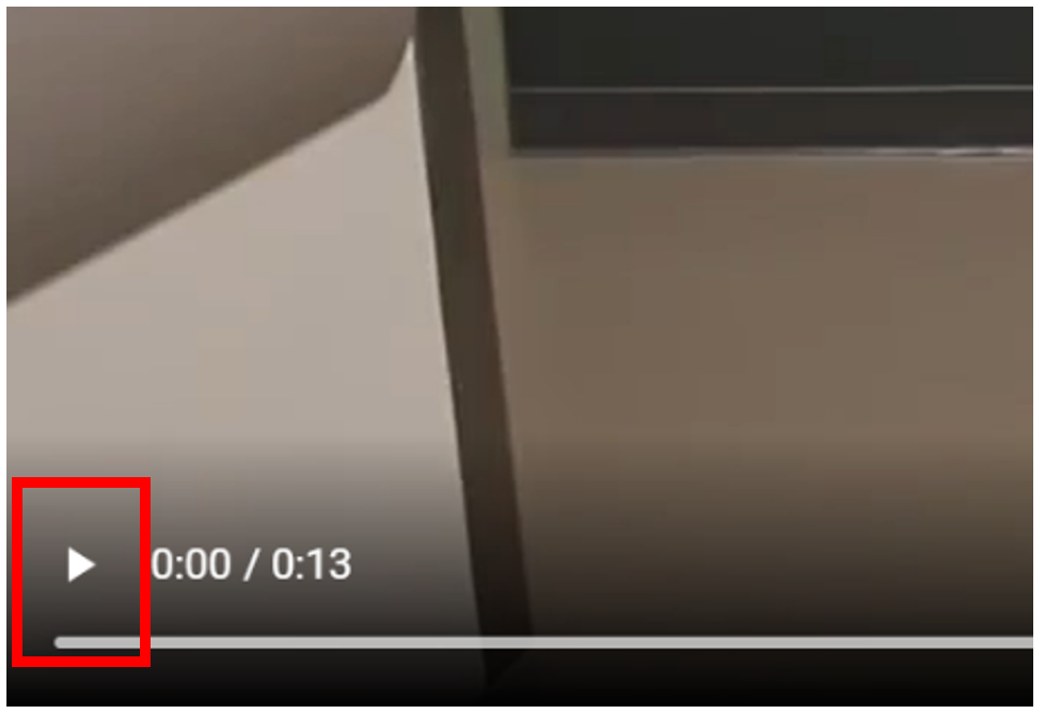 Figure 10: A screenshot of an open video resource. The play button is highlighted.
Figure 10: A screenshot of an open video resource. The play button is highlighted.To exit the video, click on the exit button on the bottom right of the video.
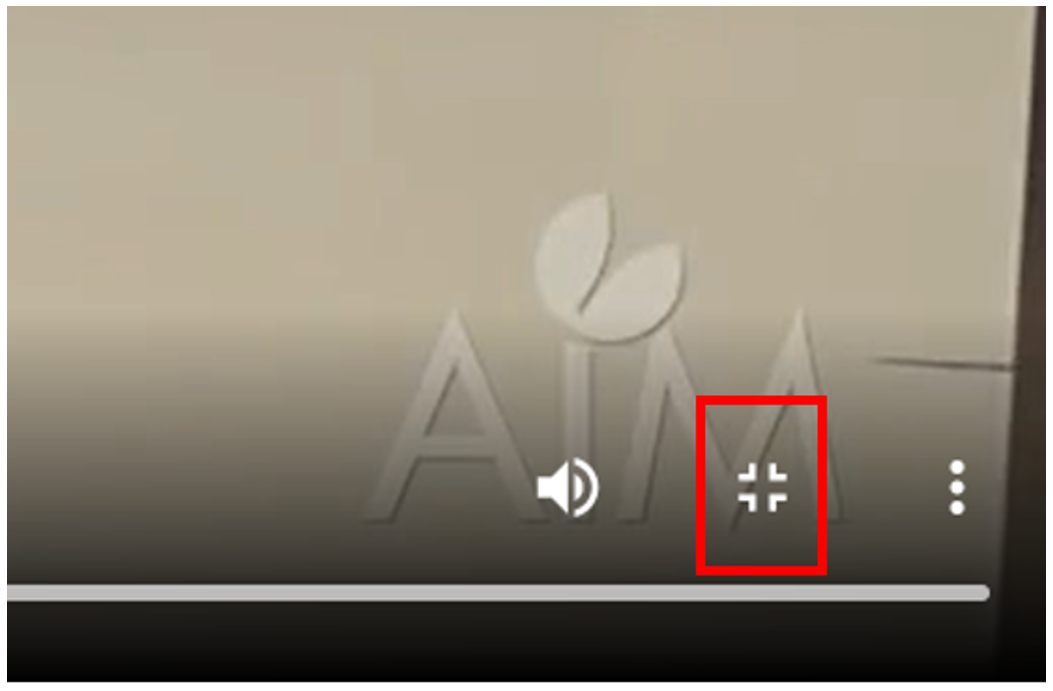 Figure 11: A screenshot of an open video resource. The exit button is highlighted.
Figure 11: A screenshot of an open video resource. The exit button is highlighted.
Autorotation
At the end of each station, you will be disconnected from the current examiner and automatically connected to the next examiner. There are no actions required from you to rotate between stations. Please ensure your microphone and camera are on at all times during the exam.
Ending the Exam
Once you have completed all your stations, the pop-up below will appear on your screen asking you to submit your exam. Click “Submit exam.”
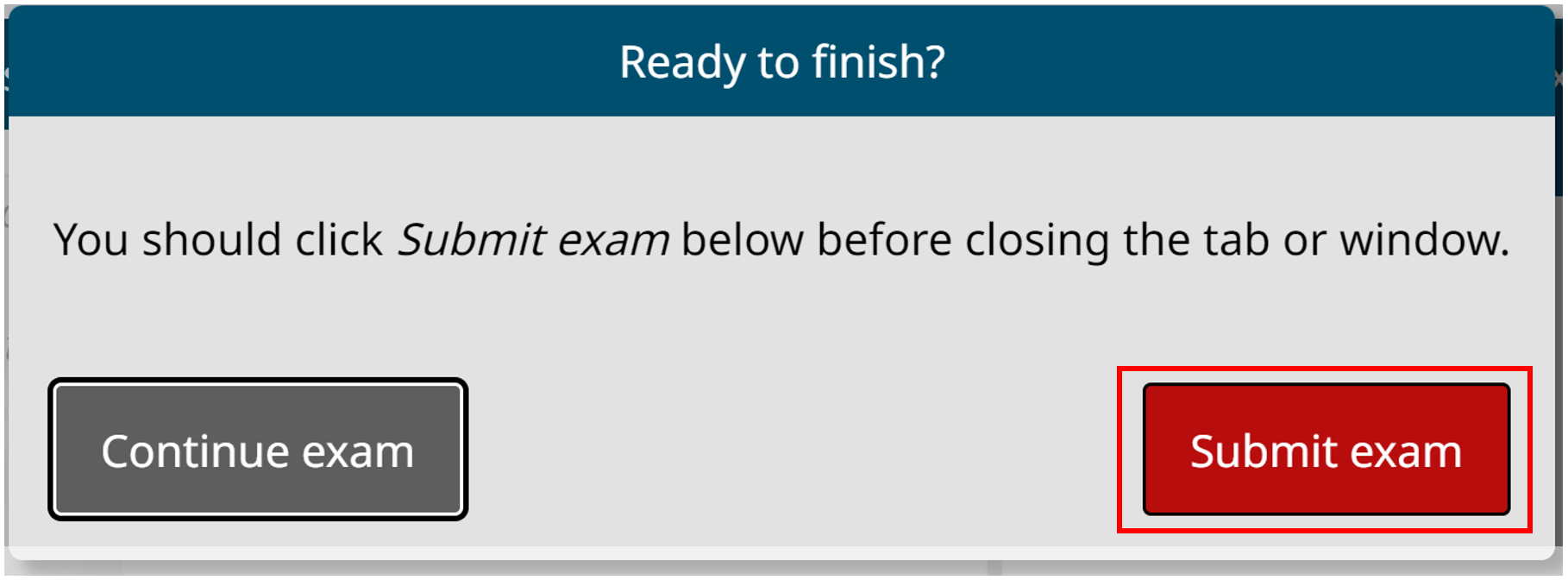 Figure 12: A screenshot of a pop-up asking the candidate to submit their exam. The Submit exam button is highlighted.
Figure 12: A screenshot of a pop-up asking the candidate to submit their exam. The Submit exam button is highlighted.
Candidate Information Session
Specialties with 4x30 format –
Vascular Surgery and Plastic Surgery
| Part 1 – General Exam Information | |
| Examiners | You will encounter 4 examiners during the course of this exam. |
| Observers | Observers may be present. They could be Royal College staff, or any other physician authorized by the RC and have no bearing on your examination. They could be observing the examination process:
|
| Part 2 – Conduct of Exam | |
| Station information
| This is a 4 station OSCE style oral exam. The stations are 30 minutes each with 5 minutes between stations. You may be provided with a scenario or instructions before your encounter with the examiner. Please read them carefully. The examiner will pose questions to you as you move through the cases. If at any point you would like to have a question repeated or discussion point expanded upon, do not hesitate to ask the examiner for clarification. The examiner will make every effort to respond to the request within the limits of the examination process. You may write notes on the provided scrap paper while you are in the room, but you must leave all paper and any other materials provided to you in the room when you finish your examination. DO NOT take anything out of the room. If you are scheduled in an AM session, you will be sequestered until the next group of candidates has all registered. If at any point you have an issue in your station or trouble with the computer, please notify your invigilator immediately. |
| Time management
| The examiner is aware of how much material needs to be covered per station and is his/her responsibility to manage the time accordingly. The examiner will want to give you every opportunity to address all the questions within the station. He/she may indicate that, “in the interests of time you will need to move to the next question”. This type of comment has no bearing on your performance. It is simply an effort to ensure that you complete the station. If at any time during the station you are unclear about something, ask the examiner to clarify. There will be a station timer embedded in the virtual station. Some stations may finish early – if this occurs, you will be asked to remain in the virtual exam room until the time is up and you are moved to the next station and examiner encounter, or the signal is made to announce the end of the exam. You will have the opportunity to use the washroom up to 15 minutes before the start of the exam, during sequestration, if applicable, or after the exam ends. |
| Examiner Professionalism | The examiners have been instructed to interact with you in a professional manner- don’t be put off if they are not as warm and friendly towards you as usual. We recognize this is a stressful situation and the examiner is aware that you are nervous. If you need a moment to collect your thoughts before responding simply indicate this to the examiner. |
| Conflicts (with examiners)
(what is a conflict? What to do in the event that you face a conflict?) | The examiners come from across the country. You will likely recognize some of them and may have worked with some of them in a clinical capacity at your own center. This is completely acceptable to the College and is not a conflict unless you or examiner perceives it as such (ie: if the examiner had a substantial contribution to your training or evaluation, or if you have another professional or personal relationship with the examiner).
Identify the conflict at moment of introduction, examiners have been instructed to do the same. Examiners will alert the Royal College staff – every attempt will be made to find a suitable replacement for the station. |
| Confidentiality | Electronic devices are NOT permitted.
Communication with other candidates during the exam is prohibited. Do not discuss the exam with other candidates taking the exam or who will be taking the exam. |
| Part 3 – Post Examination | |
| Published results | Please refer to the publication of results section on the website for the date your results will be posted. Results will be posted at 1200 EDT on the date specified for each discipline. |
| Post exam survey | An email notice will be sent by the Royal College with a link to complete an online survey. We encourage you to be honest and provide us with feedback, as it helps us improve the process and is useful as we plan future exams. If specific questions and/or stations are of concern, please describe them on survey. |
Candidate Information Session
Specialties with 6x20 format -
Hematological Pathology, Nuclear Medicine, Medical Genetics and Genomics, Neurosurgery, Psychiatry, Dermatology, Emergency Medicine, Cardiac Surgery, Respirology Adult and Ophthalmology
Part 1 - General Exam Information | |
Examiners | You will encounter 6 examiners during the course of this exam. |
Observers | Observers may be present. They could be Royal College staff, or any other physician authorized by the RC and have no bearing on your examination. They could be observing the examination process:
|
Part 2 – Conduct of Exam | |
Station information
| This is a 6 station OSCE style oral exam. The stations are 20 minutes each with 3 minutes between stations. You may be provided with a scenario or instructions before your encounter with the examiner. Please read them carefully. The examiner will pose questions to you as you move through the cases. If at any point you would like to have a question repeated or discussion point expanded upon, do not hesitate to ask the examiner for clarification. The examiner will make every effort to respond to the request within the limits of the examination process. You may write notes on the provided scrap paper while you are in the rooms but you must leave all paper and any other materials provided to you in the room when you finish your examination. DO NOT take anything out of the room. If you are scheduled in an AM session, you will be sequestered until the next group of candidates has all registered. If at any point you have an issue in your station or trouble with the computer, please notify your invigilator immediately. |
Time management
| The examiner is aware of how much material needs to be covered per station and is his/her responsibility to manage the time accordingly. The examiner will want to give you every opportunity to address all the questions within the station. He/she may indicate that, “in the interests of time you will need to move to the next question”. This type of comment has no bearing on your performance. It is simply an effort to ensure that you complete the station. If at any time during the station you are unclear about something, ask the examiner to clarify. There will be a station timer embedded in the virtual station. Some stations may finish early – if this occurs, you will be asked to remain in the virtual exam room until the time is up and you are moved to the next station and examiner encounter or the signal is made to announce the end of the exam. You will have the opportunity to use the washroom up to 15 minutes before the start of the exam, during sequestration, if applicable, or after the exam ends. |
Examiner Professionalism | The examiners have been instructed to interact with you in a professional manner- don’t be put off if they are not as warm and friendly towards you as usual. We recognize this is a stressful situation and the examiner is aware that you are nervous. If you need a moment to collect your thoughts before responding simply indicate this to the examiner. |
Conflicts (with examiners) (what is a conflict? What to do in the event that you face a conflict?) | The examiners come from across the country. You will likely recognize some of them and may have worked with some of them in a clinical capacity at your own center. This is completely acceptable to the College and is not a conflict unless you or examiner perceives it as such (ie: if the examiner had a substantial contribution to your training or evaluation, or if you have another professional or personal relationship with the examiner). Identify the conflict at moment of introduction, examiners have been instructed to do the same. Examiners will alert the Royal College staff – every attempt will be made to find a suitable replacement for the station. |
Confidentiality | Electronic devices are NOT permitted. Communication with other candidates during the exam is prohibited. Do not discuss the exam with other candidates taking the exam or who will be taking the exam. |
Part 3 – Post Examination | |
Published results | Please refer to the publication of results section on the website for the date your results will be posted. Results will be posted at 1200 EDT on the date specified for each discipline. |
Post exam survey | An email notice will be sent by the Royal College with a link to complete an online survey. We encourage you to be honest and provide us with feedback, as it helps us improve the process and is useful as we plan future exams. If specific questions and/or stations are of concern, please describe them on survey. |
Candidate Information Session
Specialties with 7×18 format –
Internal Medicine
| Part 1 – General Exam Information | |
| Examiners | You will encounter 7 examiners during the course of this exam. |
| Observers | Observers may be present. They could be Royal College staff, or any other physician authorized by the RC and have no bearing on your examination. They could be observing the examination process:
|
| Part 2 – Conduct of Exam | |
| Station information | This is a 7 station OSCE style oral exam and includes a break station. The stations are 20 minutes each with 3 minutes between stations. You may be provided with a scenario or instructions before your encounter with the examiner. Please read them carefully. The examiner will pose questions to you as you move through the cases. If at any point you would like to have a question repeated or discussion point expanded upon, do not hesitate to ask the examiner for clarification. The examiner will make every effort to respond to the request within the limits of the examination process. You may write notes on the provided scrap paper while you are in the room, but you must leave all paper and any other materials provided to you in the room when you finish your examination. DO NOT take anything into the hotel hallways. If you are scheduled in an AM session, you will be sequestered until the next group of candidates has all registered. If at any point you have an issue in your station or trouble with computer, please notify your invigilator immediately. |
| Time management | The examiner is aware of how much material needs to be covered per station and is his/her responsibility to manage the time accordingly. The examiner will want to give you every opportunity to address all the questions within the station. He/she may indicate that, “in the interests of time you will need to move to the next question”. This type of comment has no bearing on your performance. It is simply an effort to ensure that you complete the station. If at any time during the station you are unclear about something, ask the examiner to clarify. There will be a station timer embedded in the virtual station. Some stations may finish early – if this occurs, you will be asked to remain in the virtual exam room until the time is up and you are moved to the next station and examiner encounter or the signal is made to announce the end of the exam. You will have the opportunity to use the washroom up to 15 minutes before the start of the exam, during sequestration, if applicable, or after the exam ends. |
| Examiner Professionalism | The examiners have been instructed to interact with you in a professional manner- don’t be put off if they are not as warm and friendly towards you as usual. We recognize this is a stressful situation and the examiner is aware that you are nervous. If you need a moment to collect your thoughts before responding simply indicate this to the examiner. |
| Conflicts (with examiners)(what is a conflict? What to do in the event that you face a conflict?) | The examiners come from across the country. You will likely recognize some of them and may have worked with some of them in a clinical capacity at your own center. This is completely acceptable to the College and is not a conflict unless you or examiner perceives it as such (ie: if the examiner had a substantial contribution to your training or evaluation, or if you have another professional or personal relationship with the examiner). Identify the conflict at moment of introduction, examiners have been instructed to do the same. Examiners will alert the Royal College staff – every attempt will be made to find a suitable replacement for the station. |
| Confidentiality | Electronic devices are NOT permitted. Communication with other candidates during the exam is prohibited. Do not discuss the exam with other candidates taking the exam or who will be taking the exam. |
| Part 3 – Post Examination | |
| Published results | Please refer to the publication of results section on the website for the date your results will be posted. Results will be posted at 1200 EDT on the date specified for each discipline. |
| Post exam survey | An email notice will be sent by the Royal College with a link to complete an online survey. We encourage you to be honest and provide us with feedback, as it helps us improve the process and is useful as we plan future exams. If specific questions and/or stations are of concern, please describe them on survey. |
Candidate Information Session
Specialties with 8x15 format –
Obstetrics & Gynecology, Anesthesiology, Public Health and Preventive Medicine, Medical Microbiology, Orthopedic Surgery, General Surgery, Physical Medicine & Rehabilitation and Cardiology Adult
| Part 1 – General Exam Information | |
| Examiners | You will encounter 8 examiners during the course of this exam. |
| Observers | Observers may be present. They could be Royal College staff, or any other physician authorized by the RC and have no bearing on your examination. They could be observing the examination process:
|
| Part 2 – Conduct of Exam | |
| Station information
| This is an 8 station OSCE style oral exam. The stations are 15 minutes each with 3 minutes between stations. You may be provided with a scenario or instructions before your encounter with the examiner. Please read them carefully. The examiner will pose questions to you as you move through the cases. If at any point you would like to have a question repeated or discussion point expanded upon, do not hesitate to ask the examiner for clarification. The examiner will make every effort to respond to the request within the limits of the examination process. You may write notes on the provided scrap paper while you are in the room, but you must leave all paper and any other materials provided to you in the room when you finish your examination. DO NOT take anything out of the room. If you are scheduled in an AM session, you will be sequestered until the next group of candidates has all registered. If at any point you have an issue in your station or trouble with computer, please notify your invigilator immediately. |
| Time management
| The examiner is aware of how much material needs to be covered per station and is his/her responsibility to manage the time accordingly. The examiner will want to give you every opportunity to address all the questions within the station. He/she may indicate that, “in the interests of time you will need to move to the next question”. This type of comment has no bearing on your performance. It is simply an effort to ensure that you complete the station. If at any time during the station you are unclear about something, ask the examiner to clarify.
There will be a station timer embedded in the virtual station. Some stations may finish early – if this occurs, you will be asked to remain in the virtual exam room until the time is up and you are moved to the next station and examiner encounter, or the signal is made to announce the end of the exam. You will have the opportunity to use the washroom up to 15 minutes before the start of the exam, during sequestration, if applicable, or after the exam ends. |
| Examiner Professionalism | The examiners have been instructed to interact with you in a professional manner- don’t be put off if they are not as warm and friendly towards you as usual.
We recognize this is a stressful situation and the examiner is aware that you are nervous. If you need a moment to collect your thoughts before responding simply indicate this to the examiner. |
| Conflicts (with examiners)
(what is a conflict? What to do in the event that you face a conflict?) | The examiners come from across the country. You will likely recognize some of them and may have worked with some of them in a clinical capacity at your own center. This is completely acceptable to the College and is not a conflict unless you or examiner perceives it as such (ie: if the examiner had a substantial contribution to your training or evaluation, or if you have another professional or personal relationship with the examiner).
Identify the conflict at moment of introduction, examiners have been instructed to do the same. Examiners will alert the Royal College staff – every attempt will be made to find a suitable replacement for the station. |
| Confidentiality | Electronic devices are NOT permitted. Communication with other candidates during the exam is prohibited. Do not discuss the exam with other candidates taking the exam or who will be taking the exam. |
| Part 3 – Post Examination | |
| Published results | Please refer to the publication of results section on the website for the date your results will be posted. Results will be posted at 1200 EDT on the date specified for each discipline. |
| Post exam survey | An email notice will be sent by the Royal College with a link to complete an online survey. We encourage you to be honest and provide us with feedback, as it helps us improve the process and is useful as we plan future exams. If specific questions and/or stations are of concern, please describe them on survey. |
Candidate Information Session
Specialties with 8×16 format –
Neurology (Adults/Peds), Pediatrics and Rheumatology, Adult
| Part 1 – General Exam Information | |
| Examiners | You will encounter 8 examiners during the course of this exam. |
| Observers | Observers may be present. They could be Royal College staff, or any other physician authorized by the RC and have no bearing on your examination. They could be observing the examination process:
|
| Part 2 – Conduct of Exam | |
Station information
| This is an 8 station OSCE style oral exam and includes a break station. The stations are 16 minutes each with 3 minutes between stations. You may be provided with a scenario or instructions before your encounter with the examiner. Please read them carefully. The examiner will pose questions to you as you move through the cases. If at any point you would like to have a question repeated or discussion point expanded upon, do not hesitate to ask the examiner for clarification. The examiner will make every effort to respond to the request within the limits of the examination process. You may write notes on the provided scrap paper while you are in the room, but you must leave all paper and any other materials provided to you in the room when you finish your examination. DO NOT take anything into the hotel hallways. If you are scheduled in an AM session, you will be sequestered until the next group of candidates has all registered. If at any point you have an issue in your station or trouble with computer, please notify your invigilator immediately. |
Time management
| The examiner is aware of how much material needs to be covered per station and is his/her responsibility to manage the time accordingly. The examiner will want to give you every opportunity to address all the questions within the station. He/she may indicate that, “in the interests of time you will need to move to the next question”. This type of comment has no bearing on your performance. It is simply an effort to ensure that you complete the station. If at any time during the station you are unclear about something, ask the examiner to clarify.
There will be a station timer embedded in the virtual station. Some stations may finish early – if this occurs, you will be asked to remain in the virtual exam room until the time is up and you are moved to the next station and examiner encounter or the signal is made to announce the end of the exam. You will have the opportunity to use the washroom up to 15 minutes before the start of the exam, during sequestration, if applicable, or after the exam ends. |
Examiner Professionalism
| The examiners have been instructed to interact with you in a professional manner- don’t be put off if they are not as warm and friendly towards you as usual. We recognize this is a stressful situation and the examiner is aware that you are nervous. If you need a moment to collect your thoughts before responding simply indicate this to the examiner. |
Conflicts (with examiners)
(what is a conflict? What to do in the event that you face a conflict?)
| The examiners come from across the country. You will likely recognize some of them and may have worked with some of them in a clinical capacity at your own center. This is completely acceptable to the College and is not a conflict unless you or examiner perceives it as such (ie: if the examiner had a substantial contribution to your training or evaluation, or if you have another professional or personal relationship with the examiner).
Identify the conflict at moment of introduction, examiners have been instructed to do the same. Examiners will alert the Royal College staff – every attempt will be made to find a suitable replacement for the station. |
| Confidentiality | Electronic devices are NOT permitted. Communication with other candidates during the exam is prohibited. Do not discuss the exam with other candidates taking the exam or who will be taking the exam. |
| Part 3 – Post Examination | |
| Published results | Please refer to the publication of results section on the website for the date your results will be posted. Results will be posted at 1200 EDT on the date specified for each discipline. |
| Post exam survey | An email notice will be sent by the Royal College with a link to complete an online survey. We encourage you to be honest and provide us with feedback, as it helps us improve the process and is useful as we plan future exams. If specific questions and/or stations are of concern, please describe them on survey. |
Candidate Information Session
Specialties with 8×17 format –
Cardiology Peds
| Part 1 – General Exam Information | |
| Examiners | You will encounter 8 examiners during the course of this exam. |
| Observers | Observers may be present. They could be Royal College staff, or any other physician authorized by the RC and have no bearing on your examination. They could be observing the examination process:
|
| Part 2 – Conduct of Exam | |
| Station information
| This is an 8 station OSCE style oral exam. The stations are 17 minutes each with 3 minutes between stations. You may be provided with a scenario or instructions before your encounter with the examiner. Please read them carefully. The examiner will pose questions to you as you move through the cases. If at any point you would like to have a question repeated or discussion point expanded upon, do not hesitate to ask the examiner for clarification. The examiner will make every effort to respond to the request within the limits of the examination process. You may write notes on the provided scrap paper while you are in the room, but you must leave all paper and any other materials provided to you in the room when you finish your examination. DO NOT take anything out of the room. If you are scheduled in an AM session, you will be sequestered until the next group of candidates has all registered. If at any point you have an issue in your station or trouble with computer, please notify your invigilator immediately. |
| Time management
| The examiner is aware of how much material needs to be covered per station and is his/her responsibility to manage the time accordingly. The examiner will want to give you every opportunity to address all the questions within the station. He/she may indicate that, “in the interests of time you will need to move to the next question”. This type of comment has no bearing on your performance. It is simply an effort to ensure that you complete the station. If at any time during the station you are unclear about something, ask the examiner to clarify. There will be a station timer embedded in the virtual station. Some stations may finish early – if this occurs, you will be asked to remain in the virtual exam room until the time is up and you are moved to the next station and examiner encounter or the signal is made to announce the end of the exam. You will have the opportunity to use the washroom up to 15 minutes before the start of the exam, during sequestration, if applicable, or after the exam ends. |
| Examiner Professionalism | The examiners have been instructed to interact with you in a professional manner- don’t be put off if they are not as warm and friendly towards you as usual. We recognize this is a stressful situation and the examiner is aware that you are nervous. If you need a moment to collect your thoughts before responding simply indicate this to the examiner. |
| Conflicts (with examiners)
(what is a conflict? What to do in the event that you face a conflict?) | The examiners come from across the country. You will likely recognize some of them and may have worked with some of them in a clinical capacity at your own center. This is completely acceptable to the College and is not a conflict unless you or examiner perceives it as such (ie: if the examiner had a substantial contribution to your training or evaluation, or if you have another professional or personal relationship with the examiner).
Identify the conflict at moment of introduction, examiners have been instructed to do the same. Examiners will alert the Royal College staff – every attempt will be made to find a suitable replacement for the station. |
| Confidentiality | Electronic devices are NOT permitted. Communication with other candidates during the exam is prohibited. Do not discuss the exam with other candidates taking the exam or who will be taking the exam. |
| Part 3 – Post Examination | |
| Published results | Please refer to the publication of results section on the website for the date your results will be posted. Results will be posted at 1200 EDT on the date specified for each discipline. |
| Post exam survey | An email notice will be sent by the Royal College with a link to complete an online survey. We encourage you to be honest and provide us with feedback, as it helps us improve the process and is useful as we plan future exams. If specific questions and/or stations are of concern, please describe them on survey. |
Candidate Information Session
Specialties with 9×14 format –
Diagnostic Radiology
| Part 1 – General Exam Information | |
| Examiners | You will encounter 9 examiners during the course of this exam. |
| Observers | Observers may be present. They could be Royal College staff or any other physician authorized by the RC and have no bearing on your examination. They could be observing the examination process:
|
| Part 2 – Conduct of Exam | |
Station information
| This is a 9 station OSCE style oral exam. The stations are 14 minutes each with 3 minutes between stations. You may be provided with a scenario or instructions before your encounter with the examiner. Please read them carefully. The examiner will pose questions to you as you move through the cases. If at any point you would like to have a question repeated or discussion point expanded upon, do not hesitate to ask the examiner for clarification. The examiner will make every effort to respond to the request within the limits of the examination process. You may write notes on the provided scrap paper while you are in the room but you must leave all paper and any other materials provided to you in the room when you finish your examination. DO NOT take anything into the hotel hallways. If you are scheduled in an AM session, you will be sequestered until the next group of candidates has all registered. If at any point you have an issue in your station or trouble with computer, please notify your invigilator immediately. |
| Time management | The examiner is aware of how much material needs to be covered per station and is his/her responsibility to manage the time accordingly. The examiner will want to give you every opportunity to address all the questions within the station. He/she may indicate that, “in the interests of time you will need to move to the next question”. This type of comment has no bearing on your performance. It is simply an effort to ensure that you complete the station. If at any time during the station you are unclear about something, ask the examiner to clarify. There will be a station timer embedded in the virtual station. Some stations may finish early – if this occurs, you will be asked to remain in the virtual exam room until the time is up and you are moved to the next station and examiner encounter or the signal is made to announce the end of the exam. You will have the opportunity to use the washroom up to 15 minutes before the start of the exam, during sequestration, if applicable, or after the exam ends. |
| Examiner Professionalism | The examiners have been instructed to interact with you in a professional manner- don’t be put off if they are not as warm and friendly towards you as usual.
We recognize this is a stressful situation and the examiner is aware that you are nervous. If you need a moment to collect your thoughts before responding simply indicate this to the examiner. |
Conflicts (with examiners)(what is a conflict? What to do in the event that you face a conflict?) | The examiners come from across the country. You will likely recognize some of them and may have worked with some of them in a clinical capacity at your own center. This is completely acceptable to the College and is not a conflict unless you or examiner perceives it as such (ie: if the examiner had a substantial contribution to your training or evaluation, or if you have another professional or personal relationship with the examiner).
Identify the conflict at moment of introduction, examiners have been instructed to do the same. Examiners will alert the Royal College staff – every attempt will be made to find a suitable replacement for the station. |
| Confidentiality | Electronic devices are NOT permitted. Communication with other candidates during the exam is prohibited. Do not discuss the exam with other candidates taking the exam or who will be taking the exam. |
| Part 3 – Post Examination | |
| Published results | Please refer to the publication of results section on the website for the date your results will be posted. Results will be posted at 1200 EDT on the date specified for each discipline. |
| Post exam survey | An email notice will be sent by the Royal College with a link to complete an online survey. We encourage you to be honest and provide us with feedback, as it helps us improve the process and is useful as we plan future exams. If specific questions and/or stations are of concern, please describe them on survey. |
Questions about the 2024 exams
If you have other questions about the 2024 exams, please visit our frequently asked questions.
Contact us at candidates@royalcollege.ca and be sure to include your specialty in the subject line and Candidate ID number in the body of your email.
We recognize exams are a stressful experience and that we are in unprecedented times. The Royal College is committed to communicating with you in a respectful, professional and civil manner. Similarly, we ask that the same courtesy be provided to our employees. Thank you!